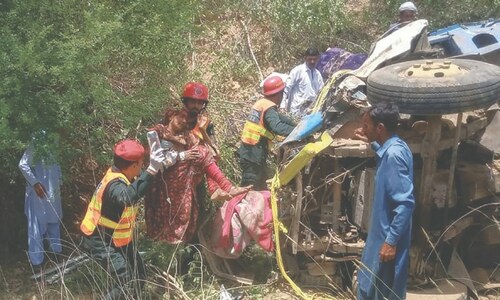BRUSSELS, March 15: Muslims across Europe feared a backlash against their community as evidence mounted on Monday of an Al Qaeda link with the deadly terror attacks that killed 200 people and injured 1,500 in Spain last week.
The bombings resulted in an unexpected election victory for the Socialist party whose leader Jose Luis Rodriguez Zapatero opposed Spain's participation in the US-led calling war on Iraq and insisted again on Monday that he would recall Spanish troops from Iraq by June 30 unless the United Nations assumes control of multinational military operations there.
European governments, fearing a repeat of the Madrid atrocities on their soil, vowed tougher security measures and stronger cooperation to fight terrorism.
The moves raised concern of an increase in Islamophobic sentiments among European public opinion and increased scrutiny of Muslim immigrants by European security services.
Muslim religious leaders have condemned the Madrid bombings but many in Europe remain suspicious of the 15 million Muslims living in their midst. Attacks on the World Trade Centre in New York in September 2001 were followed immediately by European moves to identify and detain several alleged Al Qaeda operatives and sympathizers in Europe.
The latest attacks - this time on European soil - were expected to make European Union governments even more determined to root out terrorism. "This new quality of terrorism in Europe demands an answer from all of Europe," German Chancellor Gerhard Schroeder told reporters in Berlin.
In Brussels, the European Commission warned governments they must work jointly to step up security across the bloc. "It is the duty of the Union and member states to act quickly and decisively" to help Spain and prevent a terror threat to other countries, the commission insisted.
Fighting terrorism would require "many different measures, a complete strategy," commission spokesman Reijo Kemppinen told reporters. Diplomats said the terror attacks in Spain were set to dominate an EU summit on March 25-26, originally called to breathe new life into the bloc's still flagging economies.
Ireland as current EU president said it may also convene a special emergency meeting of the bloc's interior ministers and security officials before next week's summit to focus on practical anti-terror actions.
Counter-terrorism is also expected to head the agenda of next week's meeting of EU foreign ministers in Brussels. Among a raft of new ideas emerging across the bloc, diplomats said there were growing demands that the EU should nominate a senior official to deal exclusively with counter-terrorism.
The special envoy would work under EU foreign and security policy chief Javier Solana, diplomats said, adding that the question would be on the agenda of a meeting of European Union ambassadors in Brussels this week.














































Dear visitor, the comments section is undergoing an overhaul and will return soon.